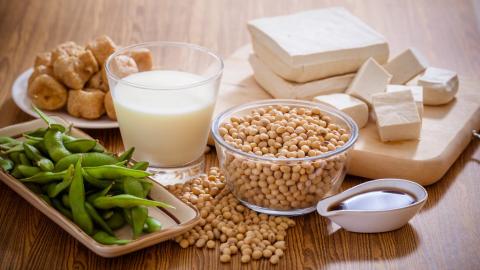
Soy comes from soybean, which is a type of legume known as Glycine max. It can be used in many forms such as the bean itself, edamame, tofu, miso, tamari, soymilk, soy-based protein powder or as soy isoflavone-based supplements.
Benefits, you may wonder?
Research suggests that soy can lessen the effects of estrogen and as a result can help to improve hot flashes. Studies have also found that consuming a higher intake of soy (1-3 servings per day), may reduce the risk of developing breast cancer, as well as reduce the risk of recurrence. Soy has also been shown to decrease the risk of mortality from all cancers.
Soy has not been found to have estrogen-like effects on human tissues such as the breast and uterus. Researchers have also not found soy to increase estrogen levels in the blood; but rather, research suggests that it may act to inhibit the effects of estrogen on cells.
How much soy should we eat?
Studies suggest consuming soy from our diet, about 1-2 servings of organic, unprocessed soy per day. At this time, the research does not support consuming soy in supplement forms.
One serving of soy averages about 7 grams of protein and 25 mg of isoflavones.
1 serving of soy is equivalent to:
- 1/2 cup of edamame (cooked/boiled)
- 1 cup of soy milk
- 1/2 cup of tofu (3 ounces)
- 1/2 cup of tempeh (3 ounces)
- 1/4 cup of miso soup
- 1/2 cup of soy yogurt
- 1 scoop of soy protein powder
Have a soy allergy?
Unfortunately, if you have an allergy or intolerance to soy, please avoid using any soy products.
Author: Simone Singh, CCNM Integrative Cancer Centre Intern
References:
- Qiu, S., & Jiang, C. (2019). Soy and isoflavones consumption and breast cancer survival and recurrence: a systematic review and meta-analysis. European journal of nutrition, 58(8), 3079–3090. https://doi.org/10.1007/s00394-018-1853-4.
- Nachvak, S. M., Moradi, S., Anjom-Shoae, J., Rahmani, J., Nasiri, M., Maleki, V., & Sadeghi, O. (2019). Soy, Soy Isoflavones, and Protein Intake in Relation to Mortality from All Causes, Cancers, and Cardiovascular Diseases: A Systematic Review and Dose-Response Meta-Analysis of Prospective Cohort Studies. Journal of the Academy of Nutrition and Dietetics, 119(9), 1483–1500.e17. https://pubmed.ncbi.nlm.nih.gov/31278047/
- Magee, P. J., & Rowland, I. (2012). Soy products in the management of breast cancer. Current opinion in clinical nutrition and metabolic care, 15(6), 586–591. https://pubmed.ncbi.nlm.nih.gov/31278047/
- Zhang, F. F., Haslam, D. E., Terry, M. B., Knight, J. A., Andrulis, I. L., Daly, M. B., Buys, S. S., & John, E. M. (2017). Dietary isoflavone intake and all-cause mortality in breast cancer survivors: The Breast Cancer Family Registry. Cancer, 123(11), 2070–2079. https://doi.org/10.1002/cncr.30615. United States Department of Agriculture, Nutrient Data Laboratory.